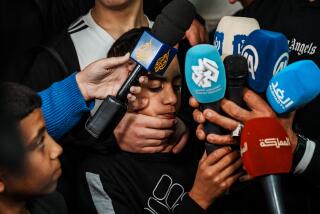U.S. Mother Battling for Son Held as Spy in Cairo
- Share via
CAIRO — A year-old espionage scandal involving Egypt and the United States took on a new twist Tuesday with the mother of an American doctor convicted of spying for the CIA threatening to begin an indefinite hunger strike to protest what she believes to be her son’s innocence.
Rose Wassef, an Egyptian-born American from Troy, Mich., said she would not break her fast until Egyptian President Hosni Mubarak agreed to see her to discuss her son’s case. She said she had aborted a hunger strike begun Monday after receiving assurances that her request for a meeting would be relayed to Mubarak upon his return from Ethiopia on Thursday. However, she asserted she is ready to fast “until it kills me” in order to obtain the release of her son.
“One week, two weeks, three weeks or five--I will die if necessary to save my son, who is innocent,” the 58-year-old mother of three told reporters outside the U.S. Embassy in Cairo.
Although Wassef’s aim is to win the release of her son Sami, who was convicted and sentenced last week to 10 years in prison, her attempts to publicize the case also have focused attention on another espionage affair with more serious implications for U.S.-Egyptian relations.
That case involves an Egyptian-born U.S. scientist, Abdel-Kader Helmy of Sacramento, who was arrested in June, 1988, for allegedly helping Egyptian agents to illegally acquire advanced U.S. missile technology.
Helmy, who worked for the Aerojet Propulsion Co. of Sacramento, recently turned state’s evidence and has been cooperating with investigators probing the dimensions of the case, which reportedly involves a number of senior Egyptian military officers, including retired Field Marshal Abdel-Halim abu Ghazala. Abu Ghazala, who until recently was widely regarded as the second most powerful man in Egypt after Mubarak, was abruptly dismissed from his post as defense minister three months ago.
The connection between the two cases rests on the widely held belief, buttressed by Wassef’s accounts of her conversations with Egyptian officials, that her son’s fate is being used by Egypt to bargain for Helmy’s release.
“Ali Hawari (Egypt’s prosecutor general) told me several times that Sami’s only crime was to have bad luck and that the way to win his release was to go to the Americans and persuade them to do something to free him. He (Hawari) said the Americans could free Sami if they wanted to,” Wassef said.
Repeated efforts to talk to Hawari about the case proved fruitless, with aides refusing to answer questions or allow reporters who telephoned his office to speak with him. But another Egyptian government official, speaking on the condition of anonymity, said he believed that the security services are using the Wassef case “to create a balance with the Helmy affair in the United States” so as to ensure that “Helmy will not involve people here, such as Abu Ghazala.”
This assessment was echoed by several diplomats, who speculated that Egypt’s intent is either to swap Wassef for Helmy or, failing that, to pressure the Justice Department into not acting on some of the more sensitive information it may now have concerning high-level Egyptian involvement in the Helmy affair.
Whatever the truth, Rose Wassef is now, by her own account, a desperate woman. She has visited Egypt, from which she emigrated in 1968, twice since learning of her son’s arrest last Nov. 11. She returned in May and has spent all of her time since then visiting her son in prison, bringing him meals and pleading with Egyptian and U.S. Embassy officials, whom she said have been of little or no help.
At their urging, as well as that of her husband, Youssef, a Detroit engineer, she kept silent about the case until last Thursday, when her son was brought before a state security court and summarily tried and convicted of espionage along with two other defendants--Sami’s elder brother, Samir, and Nicholas Edward Reynolds, an American who the prosecution said was the Wassef brothers’ CIA control officer.
Samir Wassef, an Atlanta pediatrician, and Reynolds are both in the United States and were tried in absentia. Reynolds’ whereabouts were not immediately known, but friends who knew him when he was in Cairo said they thought he lived in California.
According to the prosecution, Reynolds recruited Samir, 30, and Sami, 26, to provide him with information about Muslim fundamentalism and sectarian tensions on the campus of Cairo University, where both brothers attended medical school. Samir Wassef completed his medical training and internship and returned to the United States in 1984, according to his mother. Sami came to Egypt in 1983 and was arrested the day before his departure for the United States.
“It’s my fault,” Rose Wassef said. “I wanted so much for Sami to be a doctor. He couldn’t get into medical school in America so I pushed him, I brainwashed him into coming here. It’s all my fault,” she added, bursting into tears.
The prosecution said Reynolds received information first from Samir and then from Sami via clandestine meetings and an elaborate system of cloak-and-dagger drops involving the use of a special paper that could be destroyed quickly in the event of capture. It said the two brothers were paid $300 and $200 per month, respectively, for their reports.
It rested its case chiefly on a confession that it said Sami had signed.
Rose Wassef said her son told her that he was shown pictures of Egyptian prisoners being tortured in jail and that he was coerced into signing a confession. She also alleged that incriminating details about the case were added to her son’s confession after he signed it.
“Sami told me that his interrogators told him that they needed him to do something good and important for Egypt and that if he cooperated he would soon be freed, but that if he didn’t cooperate he would be locked away in a cell with no window and tortured,” she said.
She added that, while her son passed information along to Reynolds, he did so in his capacity as a free-lance journalist for Cairo Today, a local English-language magazine for foreigners in Egypt. She said Reynolds purported to be a correspondent for Cairo Today and that he hired Sami as his Cairo University campus “stringer.”
Left Egypt Abruptly
However, editors at Cairo Today said Reynolds never worked for the magazine and that they could not recall Sami Wassef doing so either. Reynolds, who was known to his friends in Cairo as a free-lance film maker, left Egypt abruptly in late 1987 without leaving behind any forwarding address.
Reynolds’ sudden disappearance, combined with the U.S. Embassy’s months-long silence while an American citizen was detained in Egypt without being formally charged, has led to speculation that there must be some truth to the Egyptian allegations. However, the speed of the trial and the paucity of the charges against Sami Wassef--that he reported much the same kind of information about fundamentalism as journalists and diplomats do--also fueled speculation that the case was being used as a bargaining chip in the Helmy affair.
However murky the explanation, Rose Wassef said she was shocked by the outcome of the trial and was now going public because she felt that she had been deceived by all the officials whose help she sought and whose counsel she kept over the past several months.
Her experience this week, she said, was a case in point. Arriving at the U.S. Embassy on Monday with the intention of remaining there on a hunger strike until American officials helped her to see Mubarak, she eventually was persuaded to leave after consular officials helped her get an appointment with a presidential aide at one of Mubarak’s offices.
As soon as she left the embassy, however, she was detained by plainclothes police who warned her to stop talking to the media.
Returning to the apartment of a relative where she is staying in Cairo, she said she felt a hunger strike was her only alternative.
“My family doesn’t want me to do it,” she said. “I have a bad heart condition, and they are afraid for me. But I don’t care. I am not chicken. I will die, if necessary, to save my son. I will do this until, please God, somebody helps me.”
More to Read
Sign up for Essential California
The most important California stories and recommendations in your inbox every morning.
You may occasionally receive promotional content from the Los Angeles Times.













